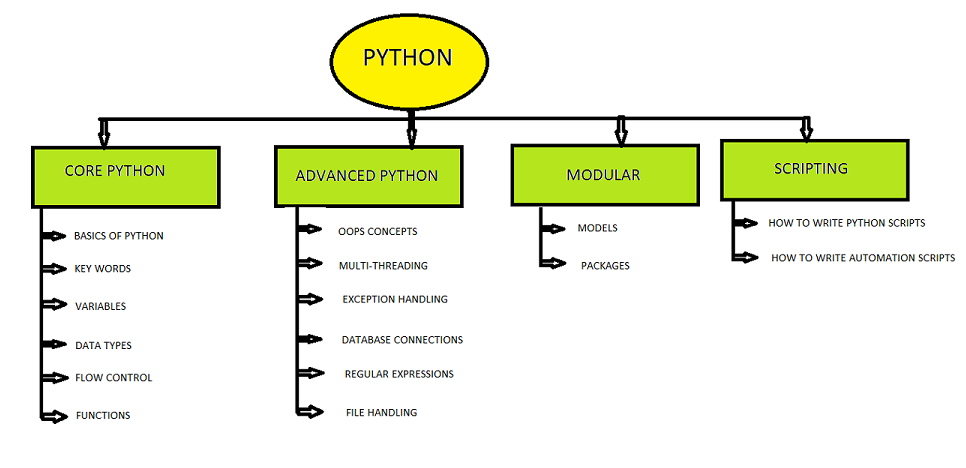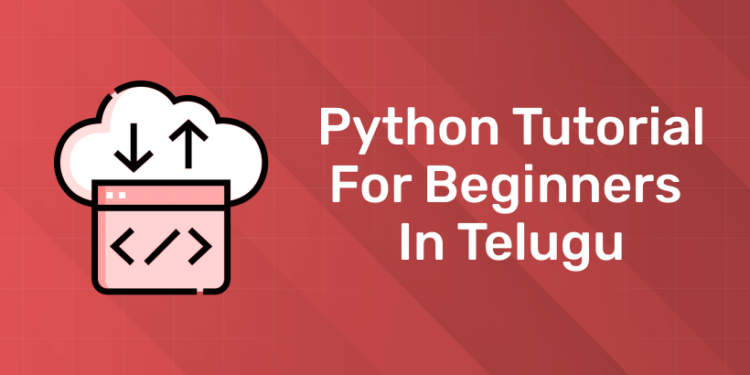Table of Contents
Python is a general-purpose, multi-paradigm, high-level programming language. Python supports both interactive and batch mode. In this article, we will discuss Python Tutorial for Beginners in Telugu. In this tutorial, the course is divided into 4 parts: core Python, advanced Python, modular, and scripting concepts. In core python, we will discuss: basics, keywords, flow control, functions etc. In advanced Python we will discuss: the Oops concept, multi-threading, exception handling, database connections, regular expressions, file handling, etc. In modular programming, we will discuss models and packages and in scripting, we will learn: how to write Python scripts and how to create automation scripts. At the time of course completion we will discuss: GUI programming, basics of data science models like Numpy, pandas, and matplot lib, unit testing, debugging, static code analysis, etc. Last but not least we will go through some Python projects. We will also share the detailed video of the Python Tutorial for Beginners in Telugu for the convenience of the learners.
Learn to code from industry experts! Get a free Demo here!
What is Python?
Here is a brief discussion about Python:
Overview:
- Python is a high-level, interpreted programming language.
- Created by Guido van Rossum in 1991.
Key Features:
- Readability: Emphasizes clear and concise code.
- Simplicity: Easy-to-learn syntax.
- Versatility: Supports multiple programming paradigms.
- Interpreted: Code executed line by line.
Popular Use Cases:
- Web Development: Django, Flask.
- Data Science and ML: NumPy, Pandas, TensorFlow.
- Scripting and Automation: Suitable for scripting and automating tasks.
- Scientific Computing: Widely used in research.
Ecosystem:
- Standard Library: Comprehensive modules and packages.
- Third-Party Libraries: Extensive resources on PyPI.
Community and Support:
- Active developer community.
- Abundant documentation and resources.
- Encourages collaboration and innovation.
Applications of Python
1: Which of the following data types is immutable in Python?
Python has vast libraries to support various applications:
Web Development:
- Django, Flask, Pyramid frameworks for web apps.
Data Science and Machine Learning:
- NumPy, Pandas, scikit-learn for data tasks.
- TensorFlow, Keras, PyTorch for ML models.
Artificial Intelligence and NLP:
- TensorFlow, Keras for AI.
- NLTK, spaCy for NLP.
Scientific Computing:
- SciPy, SymPy for math.
- Matplotlib, Plotly for visualization.
Automation and Scripting:
- Automating tasks.
- System administration scripts.
Game Development:
- Pygame for 2D games.
Desktop GUI Applications:
- Tkinter, PyQt, wxPython for GUIs.
Finance and Trading:
- Pandas, NumPy for financial analysis.
- Algorithmic trading.
Educational Tools:
- Teaching programming concepts.
Internet of Things (IoT):
- MicroPython, CircuitPython for IoT devices.
Career Opportunities of a Python Programmer
Software Developer/Engineer:
- Developing applications with Python frameworks.
Data Scientist/Analyst:
- Analyzing data with Pandas, NumPy, scikit-learn.
Machine Learning Engineer:
- Building ML models with TensorFlow, PyTorch.
AI Engineer:
- Creating AI systems using TensorFlow, Keras.
Data Engineer:
- Managing data pipelines with Python and tools like Apache Spark.
DevOps Engineer:
- Automating infrastructure using Python scripts and tools like Ansible.
QA Engineer:
- Writing test scripts with pytest, Selenium.
Systems Administrator:
- Managing IT infrastructure with Python scripts.
Educator/Trainer:
- Teaching Python programming or related topics.
Freelancer/Consultant:
- Providing Python development or data services.
| Trending Courses in Telugu | |
| Full stack Development Course in Telugu | Data Science and Machine Learning Course in Telugu |
Python Tutorial for Beginners in Telugu
The python tutorial covers the following topics:

At the course completion we will be discussing:
- GUI programming
- Basics of Data Science Models : Numpy, Panda, Matplot lib
- Unit Testing
- Debugging
- Static code Analysis
- Python projects
By the end of this course you will become an expert Python coder. In the next section we have shared a detailed tutorial video of this course in Telugu.
Python Tutorial for Beginners in Telugu: Video
Given below is the video tutorial of the python course in Telugu. Please click on the link to get access:
| Topic | Video |
| Python Tutorial for Beginners in Telugu |
Conclusion:
Python is a general purpose, multi-paradigm, high-level programming language. Python coders have high demand in the coding and web development industries. Various applications and career opportunities of python were discussed in this blog. A detailed python tutorial from beginners to advanced level was included in this blog. Finally a tutorial video in Telugu for Telugu speakers was also shared.
Frequently Asked Questions
What is Python?
Python is a general purpose, multi-paradigm, high-level programming language.
What are the key features of Python Language?
The key features are:
- Clear and Simple Syntax: Python’s code is easy to read and understand.
- Interpreted: Code is executed line by line, making it quick to develop and debug.
- Dynamic Typing: You don’t need to declare variable types explicitly.
- Multi-paradigm: Supports different coding styles like procedural and object-oriented.
- Rich Standard Library: Comes with many built-in tools for various tasks.
- Abundant Third-party Libraries: Thousands of additional tools available for different needs.
- Platform Independent: Runs on different operating systems without changes.
- Easy Integration: Works well with other languages and tools.
- Strong Community Support: Plenty of help and resources available from the Python community.
How to learn python?
You can follow the steps given below to learn python:
Online Courses and Tutorials:
- Take structured courses on websites or Apps like Entri.
- Follow video lessons and practice coding exercises.
- Progress from easy to hard lessons at your own speed.
Books:
- Read beginner-friendly books such as “Automate the Boring Stuff with Python”.
- Complete exercises to reinforce what you learn.
- Use books as a reference while coding.
Practice with Projects:
- Build simple projects like a calculator or a to-do list.
- Break down projects into small tasks and tackle them step by step.
- Experiment with new ideas to understand better.
Interactive Platforms:
- Use websites like DataCamp or LeetCode for coding practice.
- Solve coding problems and get instant feedback.
- Keep track of your progress and revisit tough concepts.
Python Documentation:
- Visit Python’s official website for guides and tutorials.
- Look up functions and modules for help.
- Learn coding best practices from the documentation.
Join Communities:
- Join forums like Stack Overflow or Reddit for help.
- Ask questions and share what you know with others.
- Work on projects with fellow learners.
Pair Programming:
- Team up with a friend or mentor to code together.
- Take turns writing and explaining code.
- Give and receive feedback to improve.
Consistent Practice:
- Practice coding regularly, even if it’s just a little every day.
- Work on coding challenges or projects.
- Repeat new concepts until you understand them well.
Seek Feedback:
- Get advice on your code from others.
- Review code together to find ways to make it better.
- Listen to feedback and learn from it.
Stay Curious:
- Keep exploring new things in Python.
- Try different projects and tools.
- Stay updated with Python news and changes.











